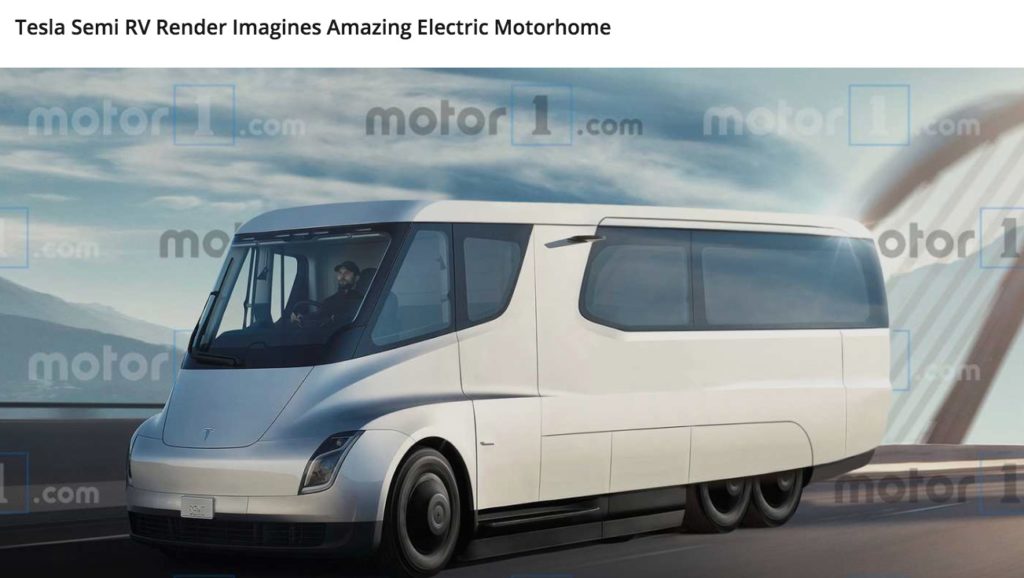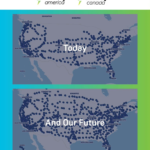The news site Motor1 rendered this concept vehicle – a recreational vehicle (RV) based on the Tesla Semi. This looks interesting, sure, and could be done obviously. It would require extending the frame perhaps, which surely seems possible to do. The thing is this doesn’t strike me as fitting the corporate goals of Tesla, and is another example of folks not properly understanding what Tesla is about.
So at the risk of me proving that I don’t understand Tesla, here’s my take.
What I understand being Tesla’s corporate goal is to accelerate the adoption of clean energy technologies, and electric vehicles, in order to avoid negative results like climate change and environmental degradation.
Most RV’s are driven very few days per year. Most RV owners leave the things parked most of the year, rolling them out a couple times a year for a vacation in the woods.
Therefore an electric RV does not displace much fossil fuels, and does not directly produce much benefit to the environment or climate.
What WOULD produce a benefit and be something along the lines of this concept design is the long range bus industry. I’m talking about Greyhound, MegaBus, and that ilk. Outside the USA I believe there are plenty of long range bus lines, even if long range bus travel is not that common in the USA.
With a combination of technologies currently in development, bus’s running on highways could displace some forms of air travel and train travel.
Consider a bus that has sufficient self-driving capabilities so that it platoons with a group of bus’s on the road. In other words, consider a chain of five bus’s traveling together using self-driving technology to keep the bus’s lined up together. It could service a small town (or towns) in the country and might be at a lower cost than railways.
I know in parts of Europe there are train lines bringing people to/from the big cities, but that the trains cannot go to every village. Instead there are a range of buses making those trips. That’s a lot of diesel-powered vehicles that need to be replaced with electric vehicles.
Long-range buses are in use every day often driving all day long. Therefore replacing a long range bus with an electric long-range bus is a big win.
In fact there’s a company, Proterra, that seems to be chasing that exact market: VAN HOOL SELECTS PROTERRA FOR ITS FIRST ALL-ELECTRIC MOTOR COACH IN THE NORTH AMERICAN MARKET![]() :
:
Van Hool makes buses explicitly for the long haul bus market. Proterra is a leading maker of electric buses. That announcement was in October 2017, a month after Proterra made this announcement: PROTERRA CATALYST® E2 MAX SETS WORLD RECORD AND DRIVES 1,101.2 MILES ON A SINGLE CHARGE![]()
That model is a regular full size city bus designed and built completely by Proterra. It wasn’t a minivan or some other small size bus, but the full deal like you’d see in any major city. They drove it over 1100 miles on a single charge, obliterating all previous records for this type of vehicle.
Clearly a capability to drive a large bus for that distance would be of use for the long haul bus industry. And– when these companies do start looking into electric buses, don’t expect them to do so on environmental issues alone. The altruism thing carries a Chief Finance Officer only so far. Look for them to claim to save megabucks on fuel costs. Like any commercial vehicle operator a long haul bus operator see’s fuel cost as the primary expense.
That’s exactly the pitch Tesla CEO Elon Musk made to the trucking industry. That the Tesla Semi offers a lower operational cost than diesel powered class 8 big trucks. Tesla or Proterra or BYD or whoever would be able to make the same argument to the long haul bus industry.
- Is there enough Grid Capacity for Hydrogen Fuel Cell or Battery Electric cars? - April 23, 2023
- Is Tesla finagling to grab federal NEVI dollars for Supercharger network? - November 15, 2022
- Tesla announces the North American Charging Standard charging connector - November 11, 2022
- Lightning Motorcycles adopts Silicon battery, 5 minute charge time gives 135 miles range - November 9, 2022
- Tesla Autopilot under US Dept of Transportation scrutiny - June 13, 2022
- Spectacular CNG bus fire misrepresented as EV bus fire - April 21, 2022
- Moldova, Ukraine, Georgia, Russia, and the European Energy Crisis - December 21, 2021
- Li-Bridge leading the USA across lithium battery chasm - October 29, 2021
- USA increasing domestic lithium battery research and manufacturing - October 28, 2021
- Electrify America building USA/Canada-wide EV charging network - October 27, 2021



















David — Very much with you on the use of electric buses for mid-distance city-to-city travel where flight not well-justified. I think this is, essentially, Greyhound. Perhaps considering how Greyhound can electrify (ex: does the scheduled turn-around time allow for this) is a fertile ground for an article.
(BTW: as I suspect you know, trains are pretty energy efficient — unless that train is only carrying a hundred or so passengers, in which case it is inefficient for such a miniscule load.)
(For my part, I think leading off that discussion re bus electrification with a headline about the RV (agreed, not good use of electrical transportation in the scheme of things) is perhaps a bit of a misdirection.)